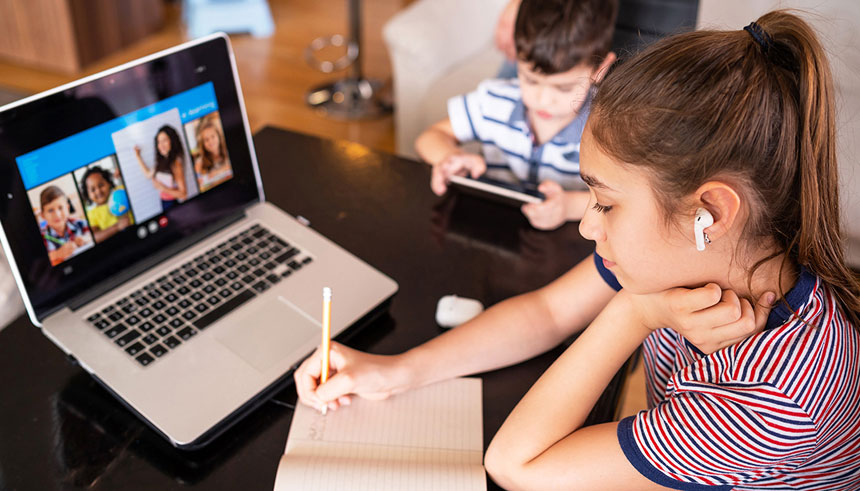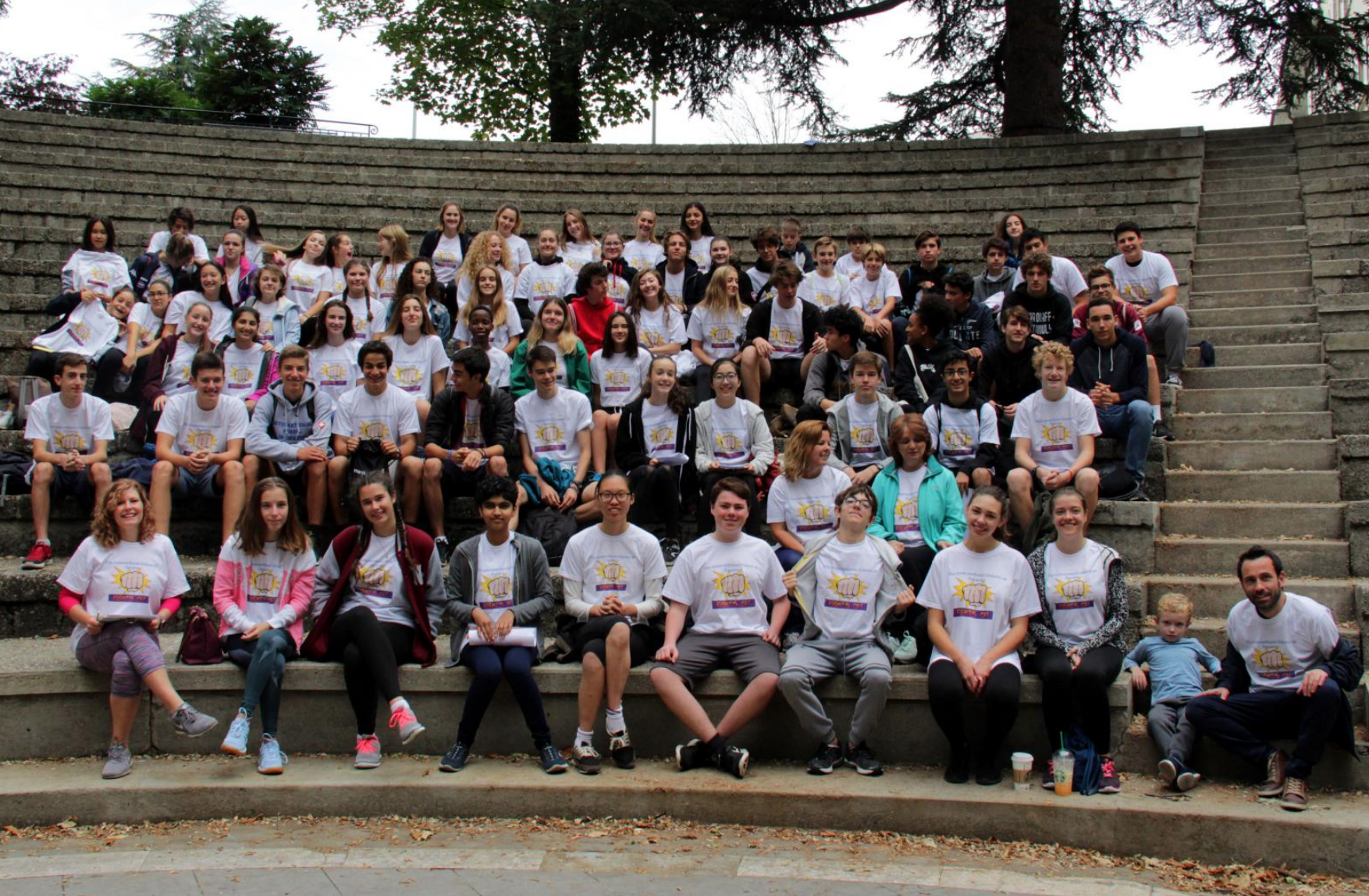By Sabine Pierce Jones & Akemi Sabatier, Y12
Against: Akemi Sabatier
The recent alarming increase in COVID-19 cases in Switzerland has pressured many schools to transfer to online classes. Swissinfo has revealed that over 10,000 cases have been reported daily since the start of November. Our campus has stated on numerous accounts that it will do everything in its power to keep students in school, but in this period of great uncertainty, we are unsure of what decision the school might have to make. However, in the midst of it all, the spread of the virus has also given rise to the spread of a new controversial question amongst students: is it better to stay in school or go online? I will be voicing certain thoughts concerning the decision to keep students in school.
Firstly, having classes at school makes it easier for students to focus in class. The energy-draining hours spent facing a computer, along with the monotony of online classes, made it hard for many to concentrate, especially towards the end of the quarantine. It’s very easy for students to begin to slack off as they must be self-moderated in their assignments and classes. Although some students can be very organised, it can be difficult for others to maintain time-management skills and resist procrastination, falling behind on assignments and being buried deeper and deeper into more and more work. For many, having classes in person also makes it easier to approach and ask the teacher questions.
Additionally, this confinement period made us appreciate the importance of socialisation and real class interaction to keep up with studies. Of course, we could stay in contact with our friends through chats and calls, but nothing could compare to a real-life conversation. Interacting with classmates through a screen can feel alienating, whereas learning in real life alongside your peers really integrates the student into the course, rather than feeling isolated at home.
Changes in the classroom environment play a subtle but significant role in staying motivated. The few tedious minutes spent rushing from the Art Centre to the Salève gave us a moment to transition from one class to another. The unchanging scenery of online school is an obstacle in learning. It’s easy for the days to start to blend together, with no real distinction from one day to the next. It’s not hard to see how the repetition of google meet after google meet for up to 8 hours straight can become tedious.
Being on campus also gives students access to the tools required in their learning. For example, the science labs and equipment. Experiments are a crucial parts of subjects within the sciences, especially for students in their IB years, who must complete their internal assessments, and perhaps their extended essays, based off the experimental work they carry out at school. Going online deprives us of those crucial facilities. Does this not only limit virtual learning to certain disciplines? While some subjects can focus entirely on theory, others rely on practice to help students understand the course. What’s more, some unlucky students may accidentally leave books behind and struggle enormously when trying to follow class from home.
Technical issues are a big disadvantage of online learning. Not everyone has access to a quiet space for learning remotely, especially for families where all members are working from home. This poses a huge difficulty to the academic success of a student. Other problems include perhaps a lack of technology needed to follow class online, as well as difficulties with wifi.
For: Sabine Pierce Jones
Online schooling was a shock to us all. How to navigate this new educational system was arduous, and seemed in an impending matter to become vital to world wide health. With the increase in COVID-19 cases it was emphatic that we all learn to orientate ourselves around these new restrictions, both teachers and students alike. Many may think that this system was only a temporary resolution and the sudden commitment to a new system was a waste of their time. On the other hand, even before the COVID-19 pandemic, there was already high growth in education technology, with the overall market for online education projected to reach $350B by 2025. Whether the use of technology is important for future jobs or to maintain education during these trying times; language apps, virtual tutoring, video conferencing tools, online learning softwares have all had a significant surge in usage and attention since COVID-19 lockdowns were put in place. However, the real question is whether online schooling has been beneficial to a student’s education or not?
Comfortable Learning Environment:
A main benefit for students is the geographic flexibility. Whilst attending online school your environment is totally up for the making. Usually you sit in a chair for eight hours with few breaks apart from walking from class to class and lunch. With school at your disposal on your device you can bring it just about anywhere. You can completely personalise your educational experience; play music, go outside, find quiet spots, and less harsh lighting – all within your control. Learning alone has benefited many, research shows that on average, students retain 25-60% more material when learning online compared to only 8-10% in a classroom. This is mostly due to the students being able to learn faster online; e-learning requires 40-60% less time to learn than in a traditional classroom setting because students can learn at their own pace, going back and re-reading, skipping, or accelerating through concepts as they choose.
Creativity:
As there is more time to spare before, after, and between classes it is so much easier for students to become creative and learn new skills. During online schooling many students flourished with creativity. Arts are crucial to mental health and expression with students. Many used their new found time for baking, cooking, music, sewing, and the list goes on. While creativity does not stop at the students, the teachers too are invited to become creative.
Documentation:
Everything is documented and easily accessible online. With more time on our hands, especially during covid, it allows students to take their time and go over their assignments. For the procrastinators, much like myself, it means we have no excuses. However, it allows students to attain self discipline at a higher level since no one is there to ensure they are on track. This gives students responsibility and self motivation. As for the perfectionists, they have all the time in the world (or at least more than with classroom learning) to perfect each piece of work.
Eco-friendly Education:
Remote education means there is a reduced need for printed textbooks, papers, or assignments. Everything can be uploaded online, much to the benefit of the school financially and environmentally.
Quality of Education:
Dependent on; access to technology, fast wifi, and devices the quality of education is indifferent. The planning, from my experience, stays the same and is entirely dependent on the teacher. One of the most important characteristics of a quality online education program is the fact that the courses were designed specifically for online delivery. Learning modules are built to be effective in engaging online experiences. Christine Greenhow, Associate Professor of Educational Psychology and Educational Technology at Michigan State University says “Research has shown that students in online learning performed better than those receiving face-to-face instruction, but it has to be done right.” What has been made clear through this pandemic is the importance of disseminating knowledge across borders, companies, and all parts of society. If online learning technology can play a role here, it is incumbent upon all of us to explore its full potential.



